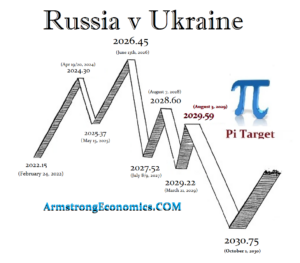The Ukraine Conflict: A Deeper Look at the Geopolitical Chessboard
The ongoing war in Ukraine has polarized opinions across the globe, with many narratives vying for dominance in the public discourse. However, at the Extreme Investor Network, we believe it’s crucial to peel back the layers and examine the underlying forces at play—not only for clarity but also for a more comprehensive understanding of economic implications for our readers and investors.
The Players Behind the Curtain
At the heart of this conflict lies intense geopolitical maneuvering by various factions, often working behind the scenes. Some analysts argue that certain groups have utilized the Ukrainian situation to fulfill their ends, viewing the Ukrainian populace as mere pawns in a larger game. This perspective points to a consistent pattern of interventionist policies by NEOCONs—those who promote a global order through radical regime changes and military actions. Instead of seeking peaceful resolutions, they sometimes seem more committed to expanding influence and power.
The Missed Opportunities for Peace
One of the most significant missed opportunities for resolving the conflict, as highlighted by various military analysts and leaders—including General Mark A. Milley, a former chief military advisor to President Biden—was the prospect of negotiation. In discussions about Ukraine, Milley stated that both Russia and Ukraine were unlikely to achieve outright victory, advocating for diplomatic solutions. Unfortunately, these calls for peace seem drowned out by the louder drums of conflict.
The fallout from the Minsk Agreement serves as an illustrative case. Initially designed to foster peace and respect for regional divides, it was undermined by ongoing provocations. We must ask ourselves: What would a peaceful Ukraine mean for European stability and global markets? The likely economic resurgence in a peaceful Ukraine could create a more favorable investing environment, undoing years of turmoil and fostering cross-border trade.
Historical Context and Evolving Dynamics
Historically, the tensions between Ukraine and Russia can be traced back to deep-rooted ethnic and cultural differences, alongside the complex interplay of Western influence. The actions taken by leaders in Kiev, fueled by external advice and arms, often appeared to escalate rather than de-escalate tensions. For instance, the attacks on the Donbas region in 2014 ignited conflicts that many now view as prelude maneuvers in a larger geopolitical chess game.
This has historically led to waves of violence, affecting civilian populations disproportionately and creating a humanitarian crisis that further complicates investment timelines and forecasts in the region. Understanding these dynamics can empower investors to make more informed decisions regarding which markets are poised to rise or fall based on geopolitical stability.
The Role of Media and Misinformation
A troubling aspect of the current environment is the influence of media narratives that often ignore nuanced truths. Many outlets perpetuate sensationalized stories that do not align with a more rooted, analytical understanding of the situation. The result is a populace that may remain misinformed about the complexities at play—leading to financial markets reactively swinging based on incomplete narratives.
At Extreme Investor Network, we emphasize the importance of critical thinking and the necessity of seeking diverse viewpoints that encourage a comprehensive understanding of global events.
Moving Forward: A Call for Transparency and Economic Realism
The current trajectory, with speculations around World War III and belligerent postures from powerful nations, urges us to advocate for transparency in governance and a focus on sustainable economic practices. As investors, we need to prepare for potential shifts in policies that could alter economic landscapes—be it through sanctions, military interventions, or alliances.
What does this all mean for investors looking to navigate these troubled waters? Staying attuned to the signs of negotiation, understanding the underlying factors that influence decisions, and adjusting strategies to mitigate risk will be paramount in the coming months and years.
In conclusion, while the situation remains dire, we must hold out hope for reasoned discourse, peace, and ultimately, economic stability. The stakes are high not just for Ukraine, but for global finance as conflict can have ripple effects across economies worldwide. By examining the roots of the current crisis, we can position ourselves not only as informed investors but as advocates for a more peaceful future.
Stay connected with us at Extreme Investor Network for ongoing insights and analysis on this ongoing crisis and its implications for global investing.

